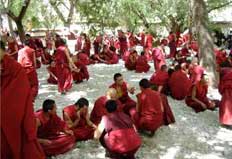 Monastery Housekeeping
Monastery HousekeepingSeveral years ago on a trip to Tibet, I visited a mountainside Buddhist monastery nestled in the spectacularly beautiful vista far beyond the bustle of urban Lhasa.
As the older vehicle that passed for a bus struggled up the mountain switchbacks, distant views of the monastery repeatedly flashed into my view and then immediately clicked off as we twisted and turned. Finally, we neared our goal, and slowly approached.
I was excited and joyful to be visiting this highly revered sanctuary, as my already deep appreciation of Buddhist monks had been heightened by my experience in a Lhasa monastery, where I was nearly brought to tears by the overwhelming presence of five hundred deeply resonate voices chanting their passionate connection to humanity and to the infinite. I could still feel their commitment and compassion resonating through my bones.
As we exited the bus and started walking toward the rural monastery, I was captivated by the crisp cool air, the stark blue of the cloudless sky, and the splendor of the mountains. I moved away from the group and walked to the edge of the plateau to get a better view of the vista. Above, the intense sun punctuating the clear sky; to the right, a landscape of drought-resistant plants and dwarf trees; across the canyon, a couple of mountain goats foraging peacefully; and below... the most immense pile of trash and garbage I have ever seen.
I have seen the urban garbage heaps that are euphemistically called "land fills." This small monastery's heap fully matched a small city's repository in size, and the noxious smells wafting from the canyon surpassed those of most any urban landfill. There were bottles, there were Coke cans, there were rusted remnants of ancient machinery, and there was garbage - today's garbage, yesterday's garbage, rotted garbage, and very rotted garbage - with no attempt whatsoever to cover it, compost it, deodorize it, or camouflage it in any way.
In a split second, my assumptions and expectations shattered like a stack of plates dropped by a stumbling waiter.
Buddhist monks weren't SUPPOSED to do this! These were the people who revered all life - the people who wouldn't step on an ant. These were the people who meticulously preserved manuscripts for thousands of years. These were the people whose every day was scheduled to the minute.
After a few minutes I realized that the giant garbage heap was actually very logical. These monks were focused on the divine and on compassion for all beings; they had little concern for the affairs of the world. In my value system, "natural beauty" held a place of honor; in theirs it did not.
Exercise: Think of a time when your assumptions and expectations about something or someone were shattered. Was the experience devastating or educational? Imagine the power of seeking out some of your assumptions and expectations and intentionally blowing them up.


 Time, like life itself, has no inherent meaning. We give our own meaning to time as to life.
Time, like life itself, has no inherent meaning. We give our own meaning to time as to life. Happiness is not something anyone else can give us... or take away from us. Happiness is what we make of our lives... or don't. Whatever our circumstances, we can create a joyful life... or a miserable life. It is up to us.
Happiness is not something anyone else can give us... or take away from us. Happiness is what we make of our lives... or don't. Whatever our circumstances, we can create a joyful life... or a miserable life. It is up to us.